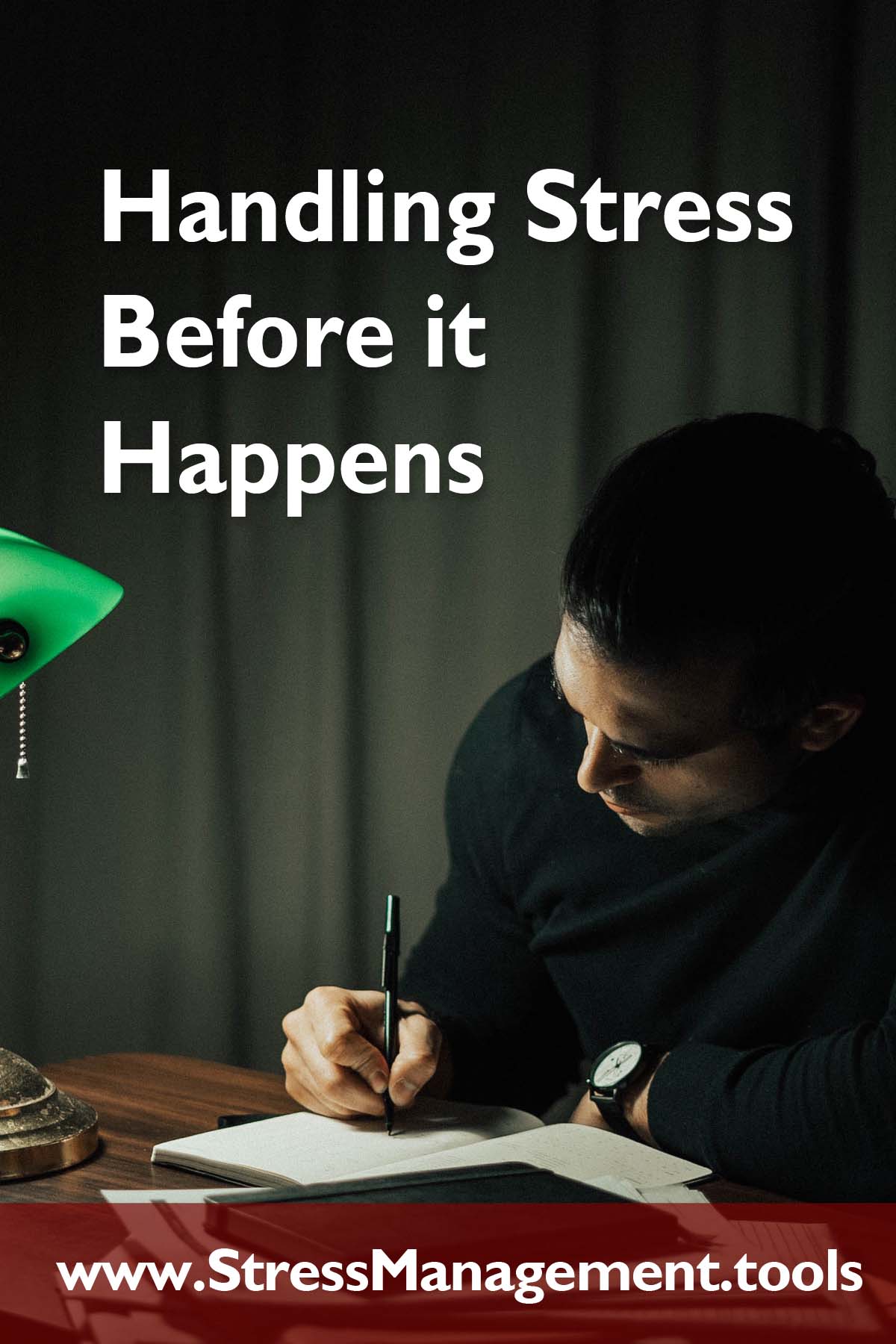Stress is something that everyone in the world will experience. Some of us deal with a lot of stress – others, not as much. But one thing that we all have in common is that we all have a reaction to stress.

When something happens to cause stress, we’ll react in either positive or negative ways. The way that you deal with stress will profoundly affect your health and well-being.
Your reaction to stress on one day can affect you emotionally the next day, and even the day before if you’re bracing for it. Unfortunately, there is no escaping stress and there are varying degrees of stress and causes behind it.
Stress Happens to Everyone
There are no groups of people or any single individuals who can avoid stress. Stress doesn’t fit neatly into any one category like a one-size-fits-all event. There are different levels of stress that will vary, depending on the person who’s dealing with it.
There are also different reasons and different times for stress to occur. You might experience more stress at a certain time of the year than other people do. However, stress does fall under the heading for four basic types.
The types of stress are encounter stress, time stress, situational stress and anticipatory stress. Encounter stress has to do with the relationships in your life. This covers your intimate relationships, your work relationships and even stranger or acquaintance relationships.
The type of life that you have can often determine whether you have a high stress level due to encounter stress. People who work in jobs where there’s a great deal of emotions (such as in a hospice care group) might have a higher rate of encounter stress than other people would normally have.

Time stress can occur when you’re feeling overwhelmed with everything that you have to get done – so you fret that you don’t have enough time. You “what if” that you’re not going to get everything done and your stress level rises.
An example of this would be having to be somewhere for an important meeting that you absolutely can’t miss and things crop up to put you behind. Sometimes people will engage in time stress before there’s even an issue.
This “what if” worry can make them feel anxious and depressed because they worry how it will affect their future. The panic it causes can result in even more stressful situations to occur.
Situational stress is what happens when you’re in a situation that causes immediate stress. An example of this can be a car accident, a child becoming ill or a job loss. In situational stress, it’s the situation that causes the worrying and the emotions that go along with it. This kind of stress can be short or long term.
Anticipatory stress is stress that you get because you’re anticipating something that’s coming your way. This might be having to give a speech or wanting to ask for a raise. It can also be about something that’s not even on the horizon.
It’s a fear that the other shoe is going to drop. This type of stress is the kind that has the most “what if” worry involved with it because it’s focused on things that haven’t even happened – and may never happen!
And when the things that you worried about do come to past, they often don’t look anywhere as frightening or terrible as what you thought they’d be. Often we discover that it was not really worth our worries.
Worrying About Stressful Situations Affects Your Health
Thinking about a problem or wondering what’s going to happen isn’t the same thing as worrying about it. When it crosses the line is when you begin to “what if.” You might “what if” about an event, a person or an unknown future.
Plenty of people will “what if” in their mind. Unfortunately, most of them create all sorts of “what ifs” that have a negative aspect to the thoughts. From that negative “what if” can spring a ton of stress that can turn into long term stress if the habit isn’t broken.

There’s nothing wrong with thinking “what if” when you’re trying to brainstorm and come up with a purpose or a plan to deal with stress. But if you do random “what ifs” where you let your mind wonder from one bad possibility to the next, this is futile and can even be bad for your health.
This kind of “what iffing” is a stagnant process that doesn’t get you anywhere. It’s like sitting in a rocking chair moving back and forth and expecting to get from point A to point B.
This negative “what iffing” doesn’t help anything and all you gain is fear and a sense of foreboding about the situation or your future. When you engage in unproductive, negative “what ifs,” you can start to experience a host of various health problems.
You can develop headaches or stomachaches. You might start to encounter muscle problems. Worrying about stress is bad for your heart health. When you worry about stress, studies have shown that this habit is known to cause high blood pressure, tachycardia and shortness of breath.
Worrying about stress can even cause heart disease. The reason that it can do this is because when you worry about stressful situations, your body gets an influx of stress hormones.
Having a regular dose of stress hormones puts additional pressure on your heart because of the high blood pressure that goes hand in hand with raised stress hormones.
Besides affecting your body’s health in a myriad of ways, worrying about stress affects your emotional health and your mental health, too. If you worry about stressful situations to the point that it becomes an ongoing habit, you can be at risk of having a mental breakdown.
This usually happens when thinking about and dealing with stress reaches the point where a person simply can’t deal with it any longer. When that happens, he or she can lose the ability to go about their day as they normally would.
It’s an abnormal response to stress that’s linked with worrying about stressful situations and feeling like there’s no relief for the stress in sight. When worrying about stressful situations reaches the point where someone is having trouble eating and begins to deal with insomnia, that’s the point where something must be done immediately to alleviate the worry.
The 4 Types of Pre-Meditated Stress Analysis
People cope with stress in different ways. These coping mechanisms can be labeled four different ways. The first one is problem analysis. With this type of coping mechanism, people think about the problem.
This way of thinking usually means the person is using “what if” in a positive way. They’re not simply turning the problem or situation over and over in their minds. They’re looking for how they can define exactly what the problem is.

This is the first step that often motivates people to reaching for a solution to the problem. When someone engages in problem analysis, they can see the problem objectively without internalizing it to the point that they dwell on it long term.
This kind of coping mechanism is highly effective and doesn’t lead to emotional or physical problems that can happen with dwelling on a stressful situation. The type of people who use this method are the type that are able to separate their lives and self-worth from the problem.
They can look at something that needs to be solved and then lay it down without it causing them to lose sleep. The second type of coping mechanism is plan rehearsal. Someone who copes this way is usually an analytical thinker.
He or she won’t dwell on negative “what ifs.” Instead, this person will think about what he can do to bring the situation to a resolution. Someone using this coping mechanism rarely thinks that there isn’t a solution to a situation regardless of what the problem is.
The person who deals with stressful situations this way usually comes up with several solutions and analyzes each one for the best outcome. People who use plan rehearsal don’t usually carry a stressful situation over into the next day emotionally.
Stagnant deliberation is one of the poorer methods that people use when dealing with stress. This is the type of person who will “what if” and think about the problem, but won’t get anywhere.
They don’t come up with a solution and so they don’t move forward. With stagnant deliberation your emotional and physical health can be affected to the point that it can make you ill.
The fourth coping mechanism is outcome fantasy. With this way of dealing with stress, people fantasize or daydream that they won’t have to deal with the problem because it will be somehow magically solved. This coping mechanism can affect emotional and physical health as well.
It’s rare that a person always uses just one type of coping mechanism. You can use a mixture of all of them but the type of people who use problem analysis and plan rehearsal don’t get stuck in the “what if” or the negative thinking about stressful situations. They might pause there, but they don’t get stuck.
How to Make an Action Plan Ahead of Time to Handle Stress
By knowing how to act rather than react to stress, you can handle stress before it becomes an issue. In every situation that happens, prioritize it. Ask yourself if the situation is yours to handle.
Too many of us deal with things that we don’t have to deal with. We take on other people’s stress. We handle things for friends, a spouse and coworkers that we shouldn’t take on.
It can be tempting to want to help and to want to fix someone else’s stress, but that’s a way to quickly become overwhelmed and stressed yourself!
Take action steps to handle stress before it happens by identifying where you feel the pressure start to build. If you know that you’re going to be pressed for time, then look at what has to be done.
Use to-do lists and pare it down to only the necessities to get you through that day or week. Let go of things that don’t matter in the long run for your health or happiness. Give yourself extra time to accomplish tasks and learn to say no to things – and people – that will eat up time to the point you know it will cause stress to begin.
Don’t focus on the things that you can’t control. For example, if you have a joint project with a colleague and you’re ready with your part, but he isn’t, don’t focus on what he didn’t do.
All you’re responsible for is what you were supposed to do. Let that person suffer the consequences rather than you suffering the stress. When you know that a situation is coming up that has the potential to turn stressful, take the time to write out a list of possible solutions.
For example if you’ve heard that your company is going to be laying people off, instead of worrying about it, write down all of the steps that you’ll take if it does happen. Once you do that, let it go. You’re prepared!
Don’t give in to negative “what if” thinking. You don’t want to attempt to cross bridges before you even come to them. You might find that the bridge never even appears in your life and you don’t want to waste time needlessly.
Do you need a guide to help you understand how to cope with Stress in an all inclusive approach? Learn how to combat stress, mentally, physically, emotionally and strategically in your life.

Martin Neumann was trained for Lifestyle Interventions in 1998 at Wildwood Lifestyle Center & Hospital. Since then he has lectured in different parts of the world about a healthy lifestyle and natural remedies. He is the founder of the Abundant Health website.
Leave a Reply